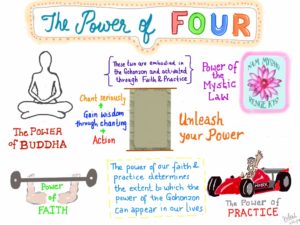Nichiren Buddhism teaches that the power of prayer and practice is not merely an act of faith but a dynamic force that brings about transformation. Central to this philosophy are the Four Powers, which are essential in manifesting one’s desires and overcoming obstacles. These powers—the Power of Faith, the Power of Practice, the Power of the Buddha, and the Power of the Law—work in harmony to create a profound and lasting impact on an individual’s life.

1. The Power of Faith
Faith is the foundational element in Nichiren Buddhism. It is not blind belief but a deep conviction in the boundless potential within oneself and the transformative power of chanting Nam-Myoho-Renge-Kyo. This faith provides the motivation to persevere despite hardships and is the catalyst for unlocking one’s inner Buddha nature. By believing in the power of the Mystic Law, practitioners develop resilience and the ability to overcome adversity.2.
2. The Power of Practice
Faith alone is not enough; it must be accompanied by consistent practice. The Power of Practice involves daily chanting (Daimoku), reciting the Lotus Sutra, and engaging in activities that spread the teachings of Nichiren Buddhism. Through dedicated practice, individuals cultivate wisdom, strengthen their resolve, and align their actions with their aspirations. This power ensures that faith is not passive but an active and transformative force in life.
3. The Power of the Buddha
The Power of the Buddha refers to the compassionate and protective influence of the Buddha’s enlightened state. In Nichiren Buddhism, it is believed that the original Buddha, embodied in the teachings of the Lotus Sutra, is ever-present and accessible to all who chant Nam-Myoho-Renge-Kyo. By tapping into this power, practitioners receive guidance, encouragement, and the strength to face challenges with courage.
4. The Power of the Law
The Power of the Law signifies the universal principles of cause and effect that govern all life. Nam-Myoho-Renge-Kyoembodies this Mystic Law, and by aligning oneself with it, practitioners can bring about positive change. This power assures that sincere efforts and prayers will yield results, as they are in harmony with the fundamental nature of the universe.
Even though the boundless powers of the Buddha and the Law are embodied in the Gohonzon, they will not set to work to benefit us of their own accord. Rather, these powers of the Buddha and the Law are manifested through our own powers of faith and practice.
To the extent that one brings forth one’s powers of faith and practice, one can manifest the powers of the Buddha and the Law within one’s own life.
On The Power of Four, excerpt from Toda Josei Zenshu (collected writings of Josei Toda; Tokyo; Seikyo Shimbunsha, 1989, vol. 4, p.42 )
“The power of the Buddha and the power of the Law increase in proportion to the strength of the power of faith and the power of practice. Therefore, bringing forth the powers of the Buddha and the Mystic Law in your life depends on the powers of your own faith and practice. The latter merge to become the powers of the Buddha and the Law, resulting in benefits that seem miraculous, defying comprehension”
The Interconnection of the Four Powers
These four powers do not operate in isolation but are deeply interconnected. Faith fuels practice, practice deepens faith, the power of the Buddha supports both, and the power of the Law ensures that sincere efforts lead to transformation. Together, they create a virtuous cycle that empowers individuals to achieve their goals, overcome difficulties, and attain enlightenment.
Conclusion
The Four Powers in Nichiren Buddhism offer a practical framework for self-transformation and achieving one’s aspirations. By cultivating faith, maintaining consistent practice, seeking guidance from the Buddha’s teachings, and aligning with the Mystic Law, individuals can navigate life’s challenges with confidence and wisdom. This dynamic approach to prayer and practice fosters not only personal growth but also contributes to a more harmonious and compassionate world.
